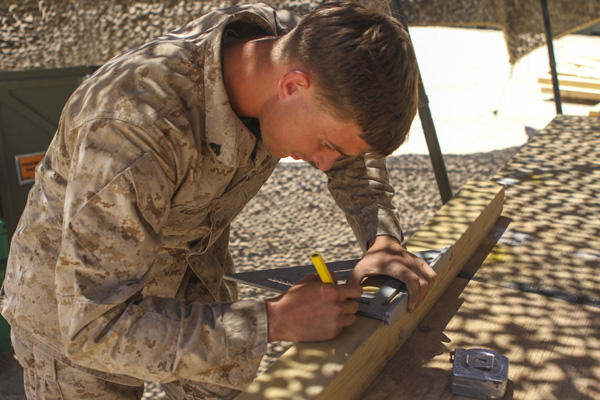MARINE CORPS AIR GROUND COMBAT CENTER TWENTYNINE PALMS, Calif. -- On an uncomfortably hot day in the Mojave Desert, many service members participating in Large Scale Exercise 2014 were preparing for the day to end.
But one Marine decided it was the perfect weather to bring out his tools and some spare wood to create something from scraps of nothing.
Cpl. Tanner Lechner, a combat engineer with Combat Service Support Company, 1st Brigade Headquarters Group, 1st Marine Expeditionary Brigade, said he enjoys his time out in the field regardless of the weather, because he gets to practice and improve his construction and creativity skills.
Before he joined the Marine Corps, Lechner lived in Topeka, Kansas, up to his early adulthood. After high school, he said, he wanted to take charge of his life and do something he enjoys.
His life-changing decision was inspired by his grandfather, who retired as a captain from the Marine Corps, Lechner said. His grandfather's stories of his career motivated him to the point that he joined the Marine Corps in 2011, he said.
"I picked combat engineer as my [specialty] when I joined," the 21-year-old Marine said. "It wasn't my first choice, but I couldn't do reconnaissance, because I was color blind. My recruiter mentioned to me, 'As a combat engineer, you'll get to build things and blow stuff up,' so I said, 'Yeah! Put me there.'"
After graduating from recruit training and his specialty school, Lechner said, he moved on to the operational forces, which gave him the opportunity to deploy and conduct his job.
"We made what [we] would call a 'triple-nickel 40' out of cratering charges on a partially dry lake bed in the Philippines," he said. "When this thing went off, it made this massive crater, and all of the water that was underground came rushing in. It instantly filled with water, and we were like, 'Hey, we made a big pond.'"
After realizing how much he enjoyed his job, Lechner said, he knew that joining the Marine Corps was one of the best decisions he's made.
"My job is the best job in the Marine Corps," he said. "Whether the ground needs to be blown to bits, a house needs to be repaired or a simple plaque needs to be created, I could do it all."
Quentin Sanders, also a combat engineer with the 1st Marine Expeditionary Brigade, spoke highly of Lechner.
"Lechner is a good guy," he said. "We're like brothers, because I've been with him since Day One. That guy is a hard worker, and he takes a lot of initiative."
Large Scale Exercise 2014 is a tool used to build U.S. and Canadian forces' joint capabilities through live, simulated and constructive military training activities. It began Aug. 8 and runs through Aug. 14.
Lechner said he supports the brigade by building things that aid with the setup of the camp.
"Pretty much anything wooden you see out here, we made it," he said. "We made the billboards in the command operations center, the benches and tables in the shower rooms, and the little tables next to the [restrooms] that hold hand sanitizer. We build those things that help you out, and it's hardly noticeable, but it's those little things that count."
Lechner said he enjoys the work he is tasked with during the exercise, because it allows more room for creativity, and it's different from a typical workday on Camp Pendleton. He plans on making a career out of construction after his enlistment, because he likes his job so much.
"After I get out of the Marine Corps, I'm going to start some college classes and join an apprenticeship program," he said. "I want to become a journeyman and then work my way to the top from there."
Eventually, he said, he wants to own his own construction company and to buy and rebuild older houses. After the restoration process, he hopes he can rent his homes out, then eventually live off that money and retire at an early age.
Lechner said he will continue doing what he loves, whether building benches and tables at Marine Corps exercises, or rebuilding homes and easing into retirement. Either way, he said, he is grateful to have honed his craft in service to the country.
Want to Know More About the Military?
Be sure to get the latest news about the U.S. military, as well as critical info about how to join and all the benefits of service. Subscribe to Military.com and receive customized updates delivered straight to your inbox.











